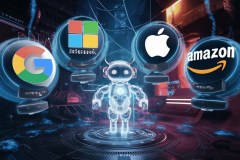Shutterstock, the leading provider of stock content, has announced its plans to expand its existing deal with OpenAI, a prominent AI research and deployment company. This strategic partnership aims to fuel AI tech innovation by providing OpenAI with extensive training data for its AI models. In return, Shutterstock will gain priority access to OpenAI’s latest technologies and new editing capabilities, enhancing the content transformation options for its customers.
Shutterstock and OpenAI have been collaborating since 2021, and this recent expansion of their partnership further solidifies Shutterstock’s commitment to driving AI tech innovation. OpenAI will license a wide range of data from Shutterstock over the next six years, including images, videos, music, and associated metadata. This comprehensive dataset will enable OpenAI to enhance its AI models and develop cutting-edge generative AI capabilities.
Generative AI has revolutionized the creative industry by offering highly customizable and on-demand content. This technology allows AI models to create unique stock images, videos, and music in real-time, posing both opportunities and challenges for stock content galleries like Shutterstock. While generative AI empowers users with endless creative possibilities, it has also raised concerns among artists and photographers who fear their work may be used without proper credit or compensation.
The use of copyrighted images in training AI models has become a contentious issue, leading to legal disputes between generative AI startups and stock image galleries. Getty Images, a major player in the stock content industry, recently filed lawsuits against Stability AI and Midjourney, accusing them of scraping copyrighted content and training their AI models without permission.
The legal landscape surrounding AI and copyright is complex and evolving. While some experts argue that training models with public images fall under the fair use doctrine, others believe explicit permission is required. As these legal matters are unlikely to be settled in the near future, companies like Shutterstock must navigate this space responsibly and ethically.
Unlike some stock image galleries, Shutterstock has embraced the potential of generative AI. By partnering with OpenAI, Shutterstock has launched an image creator powered by OpenAI’s DALL-E 2. This innovative tool allows users to generate unique and customizable images, expanding the creative possibilities for Shutterstock’s customers.
To address concerns raised by artists and photographers, Shutterstock has implemented a “contributor fund” that compensates artists for their contributions to training Shutterstock’s generative AI models. Additionally, Shutterstock maintains ongoing royalties tied to licensing for newly-generated assets, ensuring that artists receive proper recognition and compensation for their work.
Shutterstock’s commitment to developing generative AI models extends beyond its partnership with OpenAI. The company has established licensing agreements with key industry players such as Nvidia, Meta, and LG. These collaborations aim to advance generative AI across various domains, including 3D models, images, and text.
Shutterstock can leverage its expertise and resources to drive innovation in generative AI by working with industry leaders. This collaborative approach ensures that Shutterstock remains at the forefront of technological advancements while fostering mutually beneficial relationships within the AI community.
The collaboration between Shutterstock and OpenAI represents a significant step toward the future of AI-powered stock content. As generative AI continues to evolve, it will play a crucial role in meeting the growing demand for highly personalized and on-demand content. By harnessing the power of AI, Shutterstock aims to empower creatives and marketers with innovative tools that streamline the content creation process.
As the industry evolves, companies like Shutterstock need to strike a balance between technological advancements and ethical considerations. By engaging in responsible AI practices, Shutterstock can continue to support artists, photographers, and content creators while delivering cutting-edge solutions to its customers.
First reported on TechCrunch
Frequently Asked Questions
Q: What is the purpose of the partnership between Shutterstock and OpenAI?
A: The partnership between Shutterstock and OpenAI aims to fuel AI tech innovation by providing OpenAI with extensive training data for its AI models. Over the next six years, Shutterstock will provide OpenAI with a wide range of data, including images, videos, music, and associated metadata. In return, Shutterstock gains priority access to OpenAI’s latest technologies and new editing capabilities, enhancing the content transformation options for its customers.
Q: How does generative AI impact the stock content industry?
A: Generative AI has revolutionized the stock content industry by creating highly customizable and on-demand content. AI models powered by generative AI can create unique stock images, videos, and music in real-time, providing endless creative possibilities for users. However, generative AI has also raised concerns among artists and photographers who worry about their work being used without proper credit or compensation.
Q: What legal challenges are associated with training AI models using copyrighted images?
A: The legal landscape surrounding AI and copyright is complex and evolving. Some argue that training AI models with public images falls under the fair use doctrine, while others believe explicit permission is required. Legal disputes have arisen between generative AI startups and stock image galleries over the use of copyrighted content without permission. As these matters remain unresolved, companies like Shutterstock must navigate this space responsibly and ethically.
Q: How is Shutterstock addressing concerns raised by artists and photographers regarding generative AI?
A: Shutterstock has implemented a “contributor fund” to compensate artists for their contributions to training the company’s generative AI models. Additionally, Shutterstock maintains ongoing royalties tied to licensing for newly-generated assets, ensuring that artists receive proper recognition and compensation for their work. These measures aim to address concerns and ensure that artists and photographers are appropriately compensated for their contributions.
Q: What other collaborations has Shutterstock pursued in the field of generative AI?
A: Shutterstock has established licensing agreements with industry leaders such as Nvidia, Meta, and LG to advance generative AI across various domains, including 3D models, images, and text. These collaborations aim to drive innovation in generative AI and leverage the expertise and resources of industry leaders to enhance Shutterstock’s capabilities and offerings.
Q: What is the future outlook for AI-powered stock content?
A: AI-powered stock content, driven by generative AI, is expected to play a crucial role in meeting the growing demand for highly personalized and on-demand content. As the industry evolves, companies like Shutterstock will continue innovating and providing creative tools that streamline content creation.
Balancing technological advancements with ethical considerations will be crucial to ensure that artists, photographers, and content creators are adequately supported and compensated while delivering cutting-edge solutions to customers.
Featured image credit: Mojahid Mottakin; Unsplash; Thank you!










